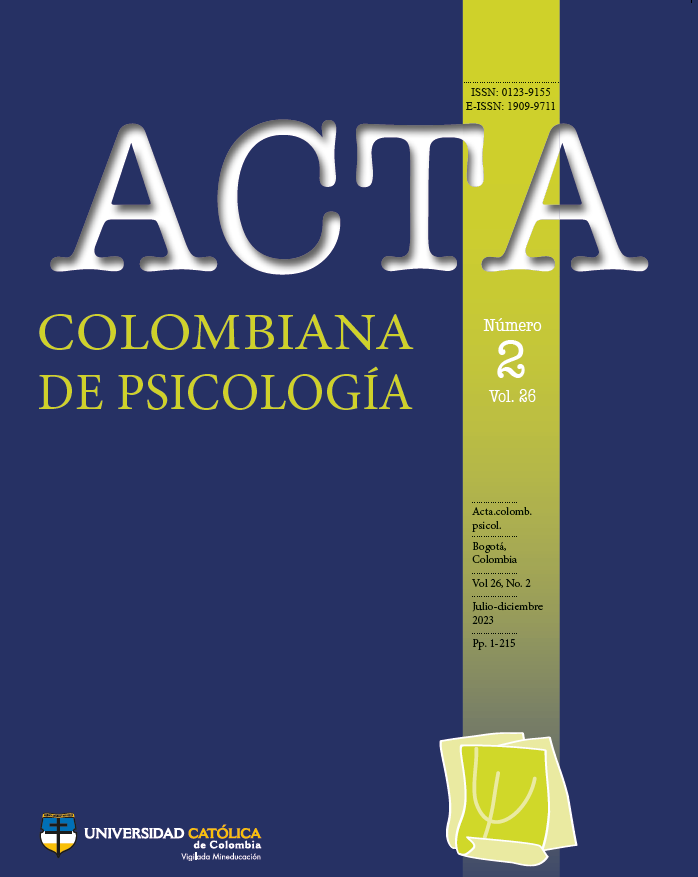
This work is licensed under a Creative Commons Attribution-NonCommercial-ShareAlike 4.0 International License.
Authors who publish in this journal agree to the following terms:
Acta Colombiana de Psicología complies with international intellectual property and copyright laws, and particularly with Article No. 58 of the Political Constitution of Colombia, Law No. 23 of 1982, and the Agreement No. 172 of September 30, 2010 (Universidad Católica de Colombia Intellectual Property Regulation).
Authors retain their copyright and grant to the Acta Colombiana de Psicología the right of first publication, with the work registered under Creative Commons attribution license, which allows third parties to use the published material, provided they credit the authorship of the work and the first publication in this Journal.

References
Blanco, A., & Valera, S. (2007). Los fundamentos de la intervención psicosocial. En A. Blanco & J. Rodríguez (Eds.), Intervención Psicosocial (pp. 3-44). Pearson Educación.
Barreto, J. R., & Petit, E. E. (2017). Modelos explicativos del proceso de innovación tecnológica en las organizaciones. Revista Venezolana de Gerencia, 22(79), 387- 405. https://www.redalyc.org/journal/290/29055964004 /29055964004.pdf
Cavallini, S., Soldi, R., Friedl, J., & Volpe, M. (2016). Using the quadruple helix approach to accelerate the transfer of research and innovation results to regional growth. European Union. https://doi.org/10.2863/408040
Drucker, P. (2014). Innovation and entrepreneurship (1.a ed.). Routledge. https://doi.org/10.4324/9781315747453
Etzkowitz, H., & Leydesdorff, L. (1995). The Triple Helix – University-industry-government relations: A laboratory for knowledge based economic development. easst Review, 14(1), 14-19. https://hdl.handle. net/11245/1.115514
Fonseca-Retana, L., Lafuente-Chryssopoulos, R., & MoraEsquivel, R. (2016). Evolución de los modelos en los procesos de innovación, una revisión de la literatura. Revista Tecnología en Marcha, 29(1), 108-117. https:// dx.doi.org/10.18845/tm.v29i1.2543
Jessop, B., Moulaert, F., Hulgσrd, A., & Hamdouch, A. (2013). Social innovation research: A new stage in innovation analysis? En F. Moulaert, D. MacCallum, A. Mehmood & A. Hamdouch (Eds.), The International Handbook on Social Innovation (pp. 426-480). Edward Elgar Publishing Limited. https://doi.org/10.4337/97818 49809993.00020
Klein, J.-L. (2017). La innovación social, ¿un factor de transformación?. Foro, 1(1), 9-26. https://www.researchgate. net/publication/319086266 López-López, W. (2020). La Coalición S y el Plan S: implicaciones para los ecosistemas de conocimiento en América Latina. Universitas Psychologica, 19, 1-4. https://doi.org/10.11144/Javeriana.upsy19.csps
Lyon, A., Brewer, S., & Areán, P. (2020). Leveraging human-centered design to implement modern psychological science: Return on an early investment. American Psychologist, 75(8), 1067-1079. https://doi.org/10.1037/ amp0000652
Menelau, S., & Adaid-Castro, B. (2017). About social innovation: Epistemological, technical, theoretical and methodological considerations on the academic production from 2008 to 2012. Brazilian Journal of Management, 10(6), 1122-1136. https://doi.org/10.5902 /1983465916098
Naciones Unidas. (2018). Informe de los Objetivos de Desarrollo Sostenible 2018. Naciones Unidas. https:// unstats.un.org/sdgs/files/report/2018/TheSustainableDe velopmentGoalsReport2018-es.pdf





























